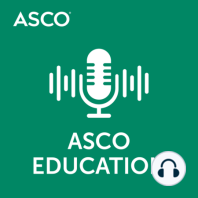6 min listen
Cancer Topics - New Therapies for Lymphoma (Part 2)
FromASCO Education
ratings:
Length:
21 minutes
Released:
Nov 15, 2021
Format:
Podcast episode
Description
In the second part of this ASCO Education Podcast episode, Dr. Sonali Smith (University of Chicago Medicine) and Dr. Paolo Strati (MD Anderson Cancer Center) discuss the application of new therapies for mantle cell lymphoma and follicular lymphoma through examination of challenging patient cases. Subscribe: Apple Podcasts, Google Podcasts | Additional resources: education.asco.org | Contact Us Air Date: 11/15/21 TRANSCRIPT [MUSIC PLAYING] SPEAKER: The purpose of this podcast is to educate and inform. This is not a substitute for medical care and is not intended for use in the diagnosis or treatment of individual conditions. Guests on this podcast express their own opinions, experience, and conclusions. The mention of any product, service, organization, activity, or therapy should not be construed as an ASCO endorsement. [MUSIC PLAYING] SONALI SMITH: Hello, and welcome to part 2 of ASCO Education Podcast on New Therapies for Lymphoma. My name is Dr. Sonali Smith, and I'm a hematologist and medical oncologist specializing in lymphoma and clinical trials for lymphoma. I am also the Elwood V. Jensen professor and chief of the Hematology and Oncology section at the University of Chicago. PAOLO STRATI: Hello to everybody. I'm Dr. Paolo Strati. I'm a hematologist, and medical oncologist, and assistant professor in the Department of Lymphoma and Myeloma and in the Department of Translational and Molecular Pathology at the University of Texas MD Anderson Cancer Center in Houston, Texas. In part one of this podcast episode, we discuss recently approved therapies for diffuse large B-cell lymphoma. And today, we will be exploring instead new therapies for follicular lymphoma and new therapies for mantle cell lymphoma. SONALI SMITH: Wonderful. So we are going to start off today with a discussion about a patient case. The individual is a 55-year-old woman with previously untreated follicular lymphoma, low-grade advanced stage, and low tumor burden, and low FLIPI. She was diagnosed three years ago and had observation but more recently developed a 7-centimeter retroperitoneal mass with impending ureteral compression and no PET/C concern for transformation, specifically with an SUVmax of 5.3. Despite this radiological finding, the patient had a performance status of 0, no symptoms, no significant comorbid health conditions, and was given R-CHOP time six cycles, followed by achievement of a CR. She was then observed, but, unfortunately, 18 months later, the PET/C showed diffuse low FDG-uptake adenopathy, and a lymph-node biopsy was repeated. This showed a follicular-lymphoma relapse. So Dr. Strati, tell us a little bit about your approach to follicular lymphoma in the initial setting. Do you consider GELF criteria? And how do you select second-line therapy in this patient? Does the early progression of disease within 18 months-- she falls into the category of POD24, or the Progression Of Disease 24 months-- how does this affect your treatment choice going forward? PAOLO STRATI: Thank you, Dr. Smith. Those are all very good questions. So going to your first question-- we typically use GELF criteria, as you know, developed in France now many years ago, most of the time of initial diagnosis. And that's to determine whether a follicular-lymphoma patient does, indeed, have an indication for treatment. And this criteria, as you know, are based on lymph node size and number, oragnomegaly, cytopenia. However, it's still debated whether this should also be applied at time of relapse. And in this particular case, the patient, as you said, had what we call a POD24, or progression of disease within 24 months from initiation of chemoimmunotherapy. Given the suboptimal outcome of these patients, I think that it will not be unreasonable to treat these patients even if they don't formally meet GELF criteria-- so even if they don't have formal indication for treatment at time of relapse. Once the decision is made, standard second-line options for patients wit
Released:
Nov 15, 2021
Format:
Podcast episode
Titles in the series (100)
ASCO Guidelines: Secondary Prevention of Cervical Cancer: ASCO Guidelines: Secondary Prevention of Cervical Cancer by ASCO Education
